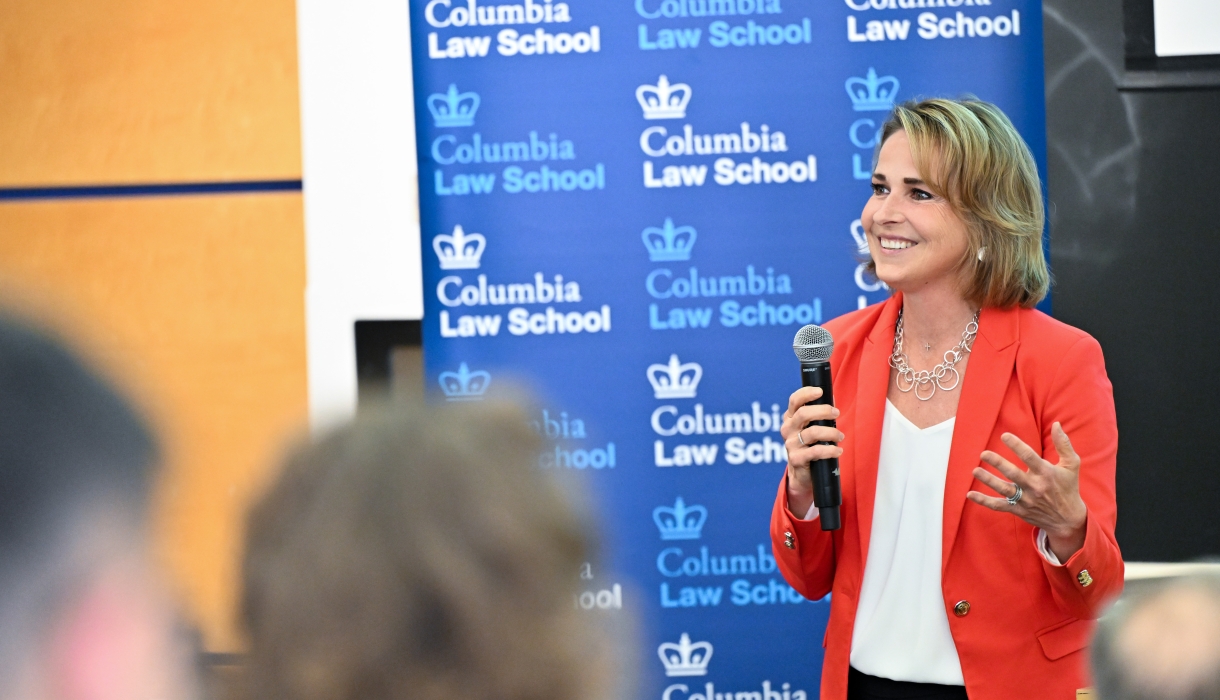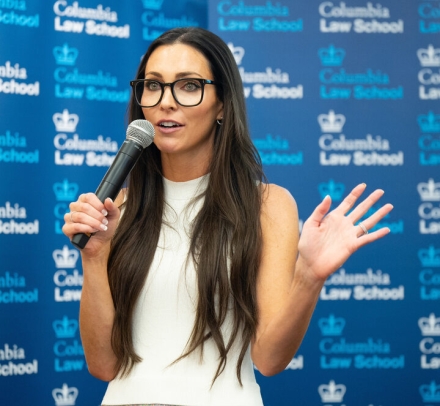Alumni Speaker Series: Anna Morawiec Mansfield ’04 on Public International Lawyering
The general counsel of the World Intellectual Property Organization shared her perspectives on a career in diplomacy, working in a multilateral setting, and the human rights dimensions of intellectual property law.

Growing up in Western Massachusetts as an immigrant from communist Poland, Anna Morawiec Mansfield ’04 developed a profound appreciation for the democratic freedoms and educational opportunities afforded her in the United States. “I was really keen to give back,” said Morawiec Mansfield, general counsel of the World Intellectual Property Organization (WIPO) in Geneva, at an Alumni Speaker Series program on April 22 at Columbia Law School. “My choice to pursue public interest work and U.S. government work was a testament to my father, who was enamored with the idea that one could help shape their government.”
After graduating from Mount Holyoke College in 1996, Morawiec Mansfield flirted with the idea of becoming a paralegal at a law firm in Washington, D.C. Instead, she decided to work overseas in international development. “I left everything behind and moved to Bosnia with no job, no prospects,” she told her student audience. “I thought to myself, ‘I’m smart. I’m capable. I’m ambitious. I’ll figure something out when I get there.’ And I did.”
Morawiec Mansfield found employment at the Organization for Security and Co-operation in Europe Mission to Bosnia and Herzegovina, eventually becoming a government-reform adviser to the mission’s head, retired U.S. Ambassador Robert Barry. She worked with international organizations and “incredibly dedicated” lawyers who were committed to promoting democratization, human rights, and legal and regulatory reform in a country that was at the time emerging from the breakup of Yugoslavia, war, and ethnic conflict. “I learned a lot about the rule of law and the importance of legal predictability, certainty, safety, and security,” she said.
Inspired by the lawyers she had worked with in Europe for five years, Morawiec Mansfield decided to return to the U.S. to get a law degree. At Columbia Law, she earned a certificate from the Parker School of Foreign and Comparative Law and served on the staff of the Columbia Law Review, where she published a note, “Ethnic But Equal: The Quest for a New Democratic Order in Bosnia and Herzegovina.”
“I had a phenomenal time here and quickly decided what I wanted to do with my legal education was immediately go back into public service,” said Morawiec Mansfield, adding that she turned down an offer from a large law firm (where she spent her 2L summer) and went to work at the U.S. State Department in the Office of the Legal Adviser (an office “affectionately known as L”).
Morawiec Mansfield said working in government early in one’s career is a crash course in hands-on lawyering compared to working in Big Law. “Yes, there’s a hierarchy, but you’re immediately thrown in,” she said. “You’re not being supervised by a senior associate who’s then supervised by a junior partner who’s being supervised by a senior partner.” At L, she cycled through several departments (“the way diplomats rotate through assignments”) and was eventually responsible for all issues pertaining to the Balkans.
The Balkans Beckon
In 2006, Morawiec Mansfield received “a fateful call” from the former president of Finland and future Nobel Peace Prize laureate, Martti Ahtisaari, who was serving as the U.N. Special Envoy of the Secretary-General for the Future Status Process for Kosovo, who invited her to be his lawyer. It was an intellectual and diplomatic challenge she relished. “No one teaches you how to write a peace agreement—there’s no handbook,” she said. “We found ourselves shuttling between Vienna, Belgrade, and Pristina to try to identify the key issues that needed to be resolved, … going through the steps of identifying the issues that an individual needs to live a safe, predictable, happy life. You need your basic life supplies, you need protection, you need security, you need to be able to honor, obey, or worship your own god. You need to have dignity, respect, and human rights.”
Morawiec Mansfield described this period as an “extremely professional and exhilarating experience,” which happened to coincide with her being pregnant. “I had my second son in Vienna in the middle of negotiations,” she said. “I found myself in shuttle diplomacy, pumping milk in bathrooms and God knows where.”
Morawiec Mansfield’s next posting was at the U.S. Mission to International Organizations in Geneva, which she described as a multilateral hub. She served as a legal adviser there for the ambassadors representing the U.S. at the Conference on Disarmament, Human Rights Council, and U.N. specialized agencies. When it came time for her to return to Washington for her next posting, she decided to stay in Europe. “I grew really fond of the idea of working in a multilateral setting permanently.”
Devoted to Diplomacy
Diplomacy, she realized, was her calling. “I believe in the international experiment,” she said. “I have seen the value of multilateral cooperation firsthand. I believe deeply in the comity of nations. I’ve lived it. My father lived it. There’s something powerful about bringing a number of different diplomats together in a room and finding a solution to a problem.”
It was this belief in diplomacy that led to her current role at WIPO, an independent international organization with 193 member states, which has its own conventions and administers 28 separate treaties. “It’s a great organization from a lawyer’s perspective to blend public international law with private international law,” said Morawiec Mansfield. Intellectual property, she noted, is more important than ever because it’s the basis for knowledge transfer in a globalized world. “We’ve seen a fundamental shift from fixed assets to intangible assets that are the key to socioeconomic development, to job growth, to economic growth.”
One of Morawiec Mansfield’s points of pride is WIPO’s diplomatic prowess. “In a world where treaty making for most people is shockingly difficult to do, and many refer to multilateralism being dead or giving way to plurilateralism or unilateralism, WIPO oversaw negotiations and delivered two new IP treaties last year,” she said. One treaty concerned design protection, and the other addressed the interface between IP, genetic resources, and traditional knowledge with provisions specifically for Indigenous peoples.
Morawiec Mansfield explained how IP law can support human rights, citing, for example, the Marrakesh Treaty to Facilitate Access to Published Works for Persons Who Are Blind, Visually Impaired or Otherwise Print Disabled, which WIPO negotiated and administers. “How can someone get an education if they can’t read? How can they get a job if they haven’t been able to read?” she said. The Marrakesh Treaty, as it is known, makes the production and international transfer of specially adapted books for people with blindness or visual impairments easier by establishing a set of limitations and exceptions to traditional copyright law. “IP law intersects with all areas of life in ways maybe you don’t appreciate on a day-to-day basis,” she said.
Morawiec Mansfield has established herself as a sharp legal mind in intellectual property matters, despite not initially specializing in IP law. She said her passion for law in the broadest sense, coupled with her aptitude for rapidly mastering technical subject matter, equipped her to hit the ground running in her role as general counsel. Now, Morawiec Mansfield is confident representing WIPO’s interests and working with WIPO’s specialized IP attorneys in navigating complex IP terrain. “You have to understand your business to be able to advise your client well,” she said. “I’ve become fluent enough in IP to be effective.”
Speaking to the students in the audience, Morawiec Mansfield made it clear that there are no shortcuts to success as a general counsel. “It’s your job to pick up a file—any file—and study that file, learn that file, and advise your client,” she said. “Do I see the same question every day? No. Am I still seeing cases of first instance? Yes. Am I still learning? Sure. Do I always know the answer? No. And so you go back to basics. You become your best legal researcher and writer. You’re noodling away and you’re trying to come up with the best legal answer for your client, whatever the question might be.”
